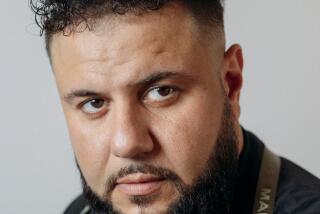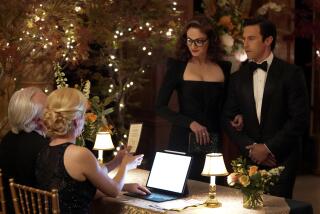Arabs: They’re Missing in New TV Season
- Share via
Being ethnic is “in” on U.S. television networks. Regrettably, American Arabs are “out.”
As a TV Times story notes, the new TV season features many of our nation’s minority and ethnic groups (“Prime Time Takes Affirmative Action,”Sept. 21). This diversity is welcomed.
And, to their credit, TV programmers are trying to offer balanced portraits. Ratings reveal that viewers are identifying with likable, well-written characters, regardless of gender, accent or color. This year, 13 new dramas and 20 fresh sitcoms display a chockablock of distinct cultural identities. About one-third of all prime-time programs feature gays and minority characters, Latinos, Asian Americans and African Americans.
NBC, CBS, Fox and UPN are presenting inventive black family sitcoms, i.e., “Built to Last,” “The Gregory Hines Show,” “Between Brothers” and “Good News.”
In November, ABC plans to air its $12-million multicultural musical “Cinderella,” with R&B; singer Brandy and Whitney Houston. Cop and ex-cop dramas, CBS’ “Brooklyn South” and ABC’s “Total Security,” feature multinational casts. CBS presents Danny Aiello as a tough Italian American private eye in “Dellaventura.” Judd Hirsch and Bob Newhart portray Jewish and Catholic fathers-in-law, respectively, in “George & Leo.” And Amy Hill, an Asian American, has a regular role in “The Naked Truth.”
Given this diverse lineup, why are America’s 8 million Arabs and Muslims so disheartened? Because no Arab American has been cast as a regular in any 1997-98 series. As in previous years, they are virtually invisible. Not one program features their customs, beliefs or accomplishments. For an Arab American, the omission is disorienting; it is like looking at a mirror and not seeing yourself.
*
Sadly, network producers still balk at presenting a series featuring an American Muslim protagonist. There are no “NYPD Blue” policemen or “Law & Order” attorneys called Mohammed, and there are no Leilas to pal around with on “Murphy Brown” or help “The Pretender” solve crimes.
Even more surprising is that only two series have ever featured Arab American characters. In the 1960s, Danny Thomas revealed his Lebanese heritage in “Make Room for Daddy.” In the 1970s, Jamie Farr portrayed Cpl. Klinger, a Lebanese American soldier who ran around as a woman in “MASH.”
There are several reasons why producers exclude Arab Americans: ignorance, prejudice, confusion between Arab heritage and the politics of the Mideast--and just plain laziness.
Lack of power and presence plays a major role. There are no Muslim communication giants comparable to Disney’s Michael Eisner, or Fox’s Rupert Murdoch, or Time Warner’s Ted Turner. Only a few Americans with Arab roots work as executives, producers and writers; others decide what viewers will or will not see.
Surprisingly, some producers falsely equate Arab Americans with TV’s stereotypical Arabs, thinking them one and the same. Each TV season, including this one, will have its share of dastardly Arabs. Weekly, the omnipresent Arab villain surfaces in 25 to 30 programs and movie reruns. They are demonized in programs such as TNT’s “Thunder in Paradise” and “The New Adventures of Robin Hood,” CBS’ “JAG,” HBO’s “Path to Paradise” and in scores of cartoons.
History teaches that when an individual’s humanity is rendered invisible, when his or her heritage is continuously vilified, innocents suffer, especially children.
Derision occurs, in part, because for half a century television has denied Arab American youngsters the right to constructively identify with their peers. Why, they ask, doesn’t television pattern protagonists after such notables as pioneer heart surgeon Michael DeBakey, or the dean of the White House press corps, Helen Thomas?
Arab and Muslim Americans have been an integral part of our landscape since 1773. They are our neighbors. There is no justification in excluding them.
When decent folks are barred from the television landscape, and when programs damage peoples’ heritage, racism is advanced. But not one network president has stepped forward to contest the stereotype nor to propose that the “invisibles” become visible.
More to Read
The complete guide to home viewing
Get Screen Gab for everything about the TV shows and streaming movies everyone’s talking about.
You may occasionally receive promotional content from the Los Angeles Times.






